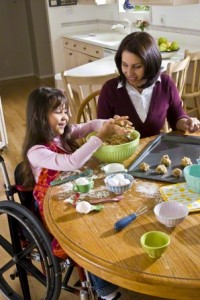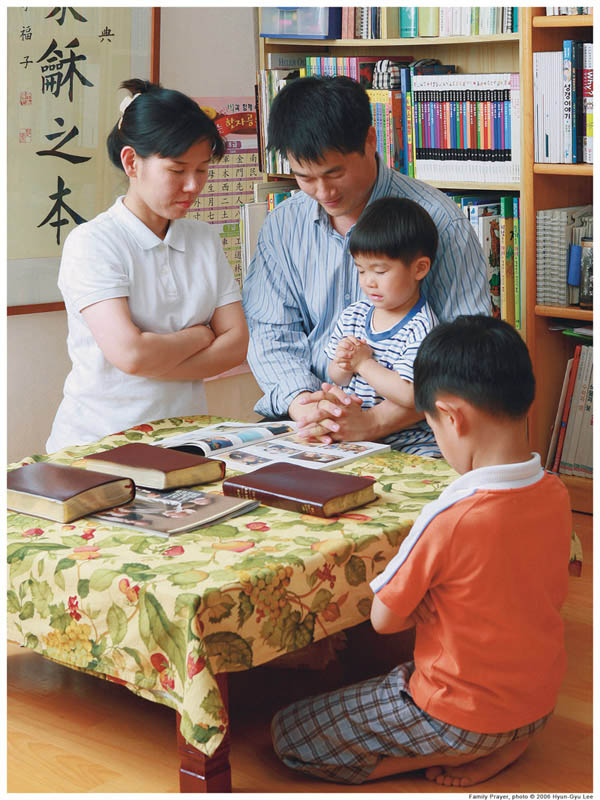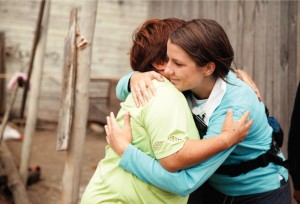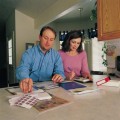A friend spoke in Sacrament Meeting (LDS worship service) recently and said that our problems are ours alone, but we alone have been given the tools to make them our servants. That thought hit me square in the face because I have been doing research on how children with disabilities affect marriage. I’ve been struggling with this article because I usually write about what I know. I feel inadequate writing about things I have never experienced firsthand. Friends asked me to write this article, and I felt compelled to make the attempt, even feeling incompetent.
 Marriage is hard enough under the best of circumstances, but adding children with disabilities complicates even the most simple of things—like meals and bedtime. I spoke with several parents of disabled children, read articles, and poured over the results of studies. A common thread emerged. This is what I learned.
Marriage is hard enough under the best of circumstances, but adding children with disabilities complicates even the most simple of things—like meals and bedtime. I spoke with several parents of disabled children, read articles, and poured over the results of studies. A common thread emerged. This is what I learned.
Life is tough. Marriage is complicated. You either work together as a team, or you grow apart. Sound familiar? Yes, it did to me too. It’s basically what all my marriage articles have said. It appears there is no magic formula concocted specifically for couples who are raising disabled children.
I began researching how marriage is affected by children with autism, which was soon expanded to all disabilities. It was pointed out to me that the problems are basically the same, whether the disability is autism, cerebral palsy, blindness, muscular dystrophy, or anything else.
Special problems arise in families with disabilities. There is more than the average financial stress, less couple time, less whole family time, hassles with red tape to get children the proper help and financial aid, extra stress on siblings, and isolation. In addition, others often are critical of parenting skills and/or the child’s behavior. Those outside the family circle often don’t have a clear understanding of the problems or how to help.
 I asked one parent what she most wanted people to know about her family, and she answered, “We may not be your version of normal, but we are our own version of normal—don’t judge.” Parents of disabled children don’t get to have the “typical” relationship with their children that others do. Everything is on the kids’ terms—even hugs and touches. I asked her who makes the day-to-day decisions about the children, and she said they work as a team and balance everything. She said structure is extremely important, and that the couple needs to take care of each other and their needs. It is a reality that this couple may have some of their children for the rest of their lives. I asked how they deal with the stress. The answer: “Prayer. You can’t let it carry over into your marriage.”
I asked one parent what she most wanted people to know about her family, and she answered, “We may not be your version of normal, but we are our own version of normal—don’t judge.” Parents of disabled children don’t get to have the “typical” relationship with their children that others do. Everything is on the kids’ terms—even hugs and touches. I asked her who makes the day-to-day decisions about the children, and she said they work as a team and balance everything. She said structure is extremely important, and that the couple needs to take care of each other and their needs. It is a reality that this couple may have some of their children for the rest of their lives. I asked how they deal with the stress. The answer: “Prayer. You can’t let it carry over into your marriage.”
Another parent told me, “First of all, you are expecting a wonderful baby and have hopes and dreams of all the things this child will accomplish. Suddenly, you realize that it’s never going to happen that way, or you go into denial and refuse to admit that there is anything wrong with your child.” This parent told me that guilt often plays havoc with parents. This was something that I personally could relate to because I had babies who were not healthy at birth. I blamed myself for not eating the right foods, not getting enough exercise, and any other way I could find to blame myself. The reality was that I was so sick during my pregnancies that I could not hold food down, and my feet and legs were so swollen that it was not practical to exercise either. I even began to wonder if it was the water in our neighborhood—then blamed myself for buying our home here.
This parent also related the following:
“Often one or more of the parents who have a disabled child have disabilities themselves. That leaves the normal partner to attend all the meetings, IEP’s (Individualized Education Program) and do all the paperwork and worrying by him or herself. If both parents are disabled, the child suffers because the parents are dealing with their own disabilities so no one ever shows up for IEP’s, or knows where or how to find the help the child needs.
Lack of services for people with disabilities, and paperwork issues cause many people with disabilities to end up living on the street. If the person with disabilities, doesn’t have someone who can see that the paperwork gets done—correctly, the person falls through the cracks and ends up without services.”
She also told me that patience, stamina, endurance, and flexibility is how she keeps her marriage together. You can never give up. She says it helps that her family is well grounded in religion. Her children are adults now, but the problems continue. There is still the endless red tape for services and financial aid. There are also ongoing problems of managing medication and behavior. It doesn’t end just because the child reaches adult age.
Another parent told me that the divorce rate is high for couples with disabled children because “men and women grieve differently and the woman thinks her husband isn’t grieving at all. Some fathers don’t want to cope with it and just walk away.”
The parents go through the same grieving process as they do when a child dies, because it is their dreams that die, at least temporarily. Most of us learn gradually that our children aren’t going to live up to our dreams. Parents of special needs kids get it all at once in an official diagnosis. It’s hard and you’re not ready for how it affects you.
In my research, I found the following:
At a time of crisis it seems that every person will cope in their own way, however, when the crisis is the birth of a disabled child, parents may be consumed with their own emotions, and may feel unable to discuss the way they are feeling with their partner. The aforementioned studies however, highlight that parents need to use their relationship as a safe haven in times of crisis, and that even though they maybe (sic) feeling consumed with their emotions, they must acknowledge that they are not in the situation alone and they are able to look to each other for support and comfort. The Effects of the Birth of a Child with A Brain-related Condition on the Parent’s Relationship, Celebra, Positively Different, http://www.cerebra.org.uk/English/getinformation/researchpapers/Pages/Theeffectsofthebirthofachildwithabrain-relatedcondition.aspx
I love the phrase “use their relationship as a safe haven in times of crisis.” Marriage is a partnership. You are a team. Every team has challenges and trials. The team can throw in the towel and accept defeat, or fight on to victory. Sometimes the fight is long and hard.
When I was a kid, our next-door neighbor had a daughter who was blind from birth. Her twin died. To keep her alive, she was given oxygen. In those days they didn’t realize that giving too much oxygen caused blindness. This poor child was pretty much confined to her room. She rocked herself all day in a little rocking chair and listened to opera music—for years. The father was ashamed of her—my guess is that he blamed himself for something over which he had no control. We moved away so I didn’t see her for years, but when I reached high school we reconnected. Her parents expected me and my friends to drag her all over school and do everything for her. They had never given her a seeing-eye dog, or a white cane. My group of friends decided we were going to take on the task of making her independent. Someone knew an adult who was blind, so we were able to acquire a white cane and showed her how to use it. We even encouraged her to get her
own food in the cafeteria. She was scared at first, but grew to love her independence. When she started to use her independence at home, her father was furious and couldn’t deal with it. Her mother was thrilled. The parents ended up getting a divorce. Blame and shame don’t work.
So I end where I began. Life is tough. Marriage is complicated. You either work together as a team, or you grow apart. There is no magic formula concocted specifically for couples who are raising disabled children; it is the same formula for all of us. Pray, work as a team, never give up, endure, have patience and stamina, make time for each other, make time for family, keep God in your life, and make your marriage your safe haven. Rely on each other and you can get through anything and everything. As my friend put it, our problems are ours alone, but we alone have been given the tools to make them our servants. Use the tools. I submit that your marriage is probably the best tool you have to get through these problems, but all tools have to be used properly.
Please visit these informative websites to learn more about coping with disabilities:
WarmLine Family Resource Center, http://www.warmlinefrc.org/resources.html
Celebra, Positively Different, Research Papers, The Effects of the Birth of a Child with a Brain-related Condition on the Parent’s Relationship, http://www.cerebra.org.uk/English/getinformation/researchpapers/Pages/Theeffectsofthebirthofachildwithabrain-relatedcondition.aspx
Celebra, Positively Different, Research Papers, Research Summary—Parent-to-parent support—does it help?, http://www.cerebra.org.uk/English/getinformation/researchpapers/Pages/ResearchSummary-Parent-to-parentsupport-doesithelp.aspx
About Tudie Rose
Tudie Rose is a mother of four and grandmother of ten in Sacramento, California. You can find her on Twitter as @TudieRose. She blogs as Tudie Rose at http://potrackrose.wordpress.com. She has written articles for Familius. You will find a Tudie Rose essay in Lessons from My Parents, Michele Robbins, Familius 2013, at http://www.familius.com/lessons-from-my-parents.
Twitter •








